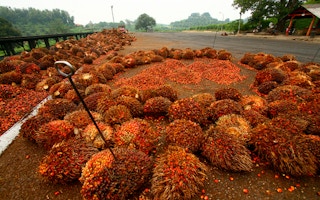Clearing forests for palm oil plantations is a “technical” matter that should not get tied up with trade discussions, an Indonesian minister told a land and poverty conference.
Growing global demand for palm oil is fuelling rapid deforestation in Indonesia, at a faster pace than in Brazil’s Amazon region, making Indonesia a major contributor to global warming.
But Prabianto Mukti Wibowo, assistant deputy minister for forestry in the Economic Affairs Ministry, told a World Bank conference on land and poverty held in Washington this week that deforestation was a rich-country concern.
“
The zero deforestation commitment should not be a trade barrier because deforestation is a governance issue and about effective implementation, not about trade.
Prabianto Mukti Wibowo, assistant deputy minister for forestry in the Economic Affairs Ministry, Indonesia
“We know that our primary customers are not concerned about deforestation,” he said.
Asian nations, led by India, China and Pakistan, buy 55 per cent of Indonesia’s palm oil exports, while Europe buys only 8 per cent, yet Europe puts much of the pressure on Indonesia not to cut down and burn forests to make way for plantations, he said.
Palm oil is important to Indonesia’s development because it reduces poverty by bringing roads, schools and other infrastructure to rural communities and generates five million jobs that benefit 15 million people, Wibowo said.
The pace of forest loss declined rapidly between 2009 and 2013, he said, even before last year’s New York Declaration on Forests called for an end to deforestation by 2020.
Hence the issue should be treated as a technical matter not a trade issue, and reserved for discussion in such forums as the Roundtable on Sustainable Palm Oil (RSPO) among industry, investors and civil society groups, he said.
“The zero deforestation commitment should not be a trade barrier because deforestation is a governance issue and about effective implementation, not about trade,” Wibowo said.
Illegal logging, a primary source of deforestation in Indonesia, is under discussion at the World Trade Organisation, which aims to complete some environmental negotiations by July as part of the Doha round of global trade talks.
Indonesia also signed a 2006 memorandum to combat illegal logging as part of its trade agreement with the United States.








